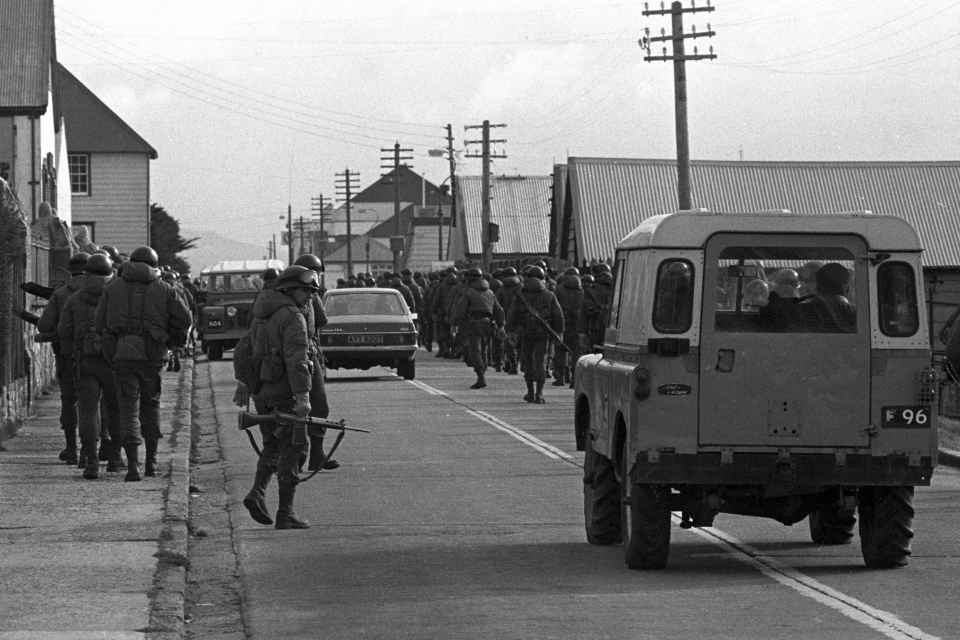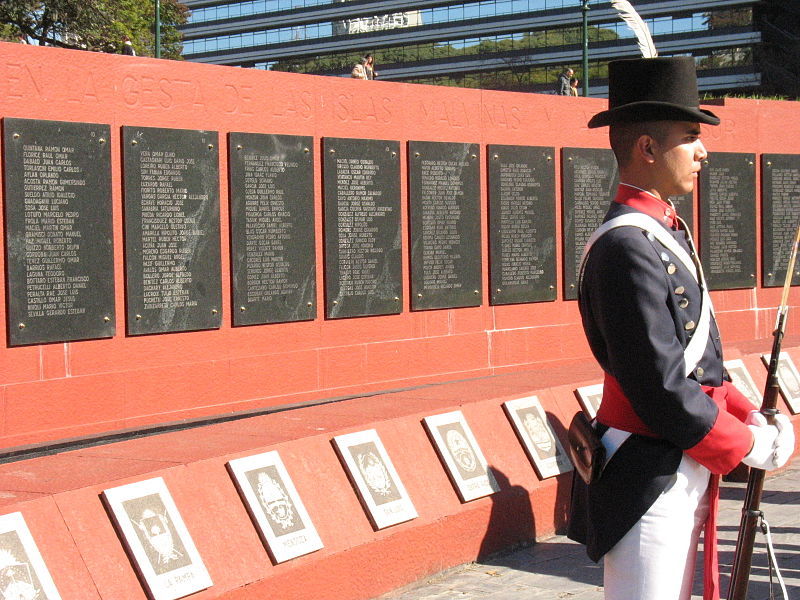Falklands War
The Falklands War (Spanish: Guerra de las Malvinas) was a 10-week undeclared war between Argentina and the United Kingdom in 1982 over two British dependent territories in the South Atlantic: the Falkland Islands and its territorial dependency, South Georgia and the South Sandwich Islands. The result of the war was a British victory.
The conflict began on 2 April, when Argentina invaded and occupied the Falkland Islands, followed by the invasion of South Georgia the next day. On 5 April, the British government dispatched a naval task force to engage the Argentine Navy and Air Force before making an amphibious assault on the islands. The conflict lasted 74 days and ended with an Argentine surrender on 14 June, returning the islands to British control. In total, 649 Argentine military personnel, 255 British military personnel, and three Falkland Islanders died during the hostilities.
The conflict was a major episode in the protracted dispute over the territories' sovereignty. Argentina asserted (and maintains) that the islands are Argentine territory, and the Argentine government thus characterised its military action as the reclamation of its own territory. The British government regarded the action as an invasion of a territory that had been a Crown colony since 1841. Falkland Islanders, who have inhabited the islands since the early 19th century, are predominantly descendants of British settlers, and strongly favour British sovereignty. Neither state officially declared war, although both governments declared the Islands a war zone.
The conflict has had a strong effect in both countries and has been the subject of various books, articles, films, and songs. Patriotic sentiment ran high in Argentina, but the outcome prompted large protests against the ruling military government, hastening its downfall and the democratisation of the country. In the United Kingdom, the Conservative government, bolstered by the successful outcome, was re-elected with an increased majority the following year. The cultural and political effect of the conflict has been less in the UK than in Argentina, where it remains a common topic for discussion.
Diplomatic relations between the United Kingdom and Argentina were restored in 1989 following a meeting in Madrid, at which the two governments issued a joint statement. No change in either country's position regarding the sovereignty of the Falkland Islands was made explicit. In 1994, Argentina adopted a new Constitution, which added the Falkland Islands as an Argentine Province by law.


Prelude
Failed diplomacy
In 1965, the United Nations called upon Argentina and the United Kingdom to reach a settlement of the sovereignty dispute. The UK Foreign and Commonwealth Office (FCO) regarded the islands as a nuisance and barrier to UK trade in South America, so, whilst confident of British sovereignty, was prepared to cede the islands to Argentina. When news of a proposed transfer broke in 1968, elements sympathetic with the plight of the islanders were able to organise an effective Parliamentary lobby to frustrate the FCO plans. Negotiations continued but in general failed to make meaningful progress; the islanders steadfastly refused to consider Argentine sovereignty on one side, whilst Argentina would not compromise over sovereignty on the other. The FCO then sought to make the islands dependent on Argentina, hoping this would make the islanders more amenable to Argentine sovereignty. A Communications Agreement signed in 1971 created an airlink and later YPF, the Argentine oil company, was given a monopoly in the islands.
In 1980, a new Minister of State for Foreign Affairs, Nicholas Ridley, went to the Falklands trying to sell the islanders the benefits of a leaseback scheme, which met with strong opposition from the islanders. On returning to London in December 1980 he reported to parliament but was viciously attacked at what was seen as a sellout. (It was unlikely that leaseback could have succeeded since the British had sought a long-term lease of 99 years, whilst Argentina was pressing for a much shorter period of only 10 years.) At a private committee meeting that evening, it was reported that Ridley cried out: "If we don't do something, they will invade. And there is nothing we could do".
The 1976 military coup and the Argentine junta
In the period leading up to the war—and, in particular, following the transfer of power between the military dictators General Jorge Rafael Videla and General Roberto Eduardo Viola late in March 1981—Argentina had been in the midst of devastating economic stagnation and large-scale civil unrest against the military junta that had been governing the country since 1976.
In December 1981 there was a further change in the Argentine military regime, bringing to office a new junta headed by General Leopoldo Galtieri (acting president), Air Brigadier Basilio Lami Dozo and Admiral Jorge Anaya. Anaya was the main architect and supporter of a military solution for the long-standing claim over the islands, calculating that the United Kingdom would never respond militarily.
By opting for military action, the Galtieri government hoped to mobilise the long-standing patriotic feelings of Argentines towards the islands, and thus divert public attention from the country's chronic economic problems and the regime's ongoing human rights violations of the Dirty War.[18] Such action would also bolster its dwindling legitimacy. The newspaper La Prensa speculated in a step-by-step plan beginning with cutting off supplies to the islands, ending in direct actions late in 1982, if the UN talks were fruitless.
The ongoing tension between the two countries over the islands increased on 19 March, when a group of Argentine scrap metal merchants (actually infiltrated by Argentine Marines) raised the Argentine flag at South Georgia Island, an act that would later be seen as the first offensive action in the war. The Royal Navy ice patrol vessel HMS Endurance was dispatched from Stanley to South Georgia on the 25th in response. The Argentine military junta, suspecting that the UK would reinforce its South Atlantic Forces, ordered the invasion of the Falkland Islands to be brought forward to 2 April.
The UK was initially taken by surprise by the Argentine attack on the South Atlantic islands, despite repeated warnings by Royal Navy captain Nicholas Barker (commander of the Endurance) and others. Barker believed that Defence Secretary John Nott's 1981 review (in which Nott described plans to withdraw the Endurance, the UK's only naval presence in the South Atlantic) had sent a signal to the Argentines that the UK was unwilling, and would soon be unable, to defend its territories and subjects in the Falklands.

Argentine invasion
On 2 April 1982 Argentine forces mounted amphibious landings, known as Operation Rosario, on the Falkland Islands. The invasion was met with a nominal defence organised by the Falkland Islands' Governor Sir Rex Hunt, giving command to Major Mike Norman of the Royal Marines. The events of the invasion included the landing of Lieutenant Commander Guillermo Sanchez-Sabarots' Amphibious Commandos Group, the attack on Moody Brook barracks, the engagement between the troops of Hugo Santillan and Bill Trollope at Stanley, and the final engagement and surrender at Government House.


Initial British response
The British had already taken action prior to the 2 April invasion. In response to events on South Georgia, on 29 March, Ministers decided to send the Royal Fleet Auxiliary (RFA) Fort Austin south from the Mediterranean to support HMS Endurance, and the submarine HMS Spartan from Gibraltar, with HMS Splendid ordered south from Scotland the following day. Lord Carrington had wished to send a third submarine, but the decision was deferred due to concerns about the impact on operational commitments. Coincidentally, on 26 March, the submarine HMS Superb left Gibraltar and it was assumed in the press it was heading south. There has since been speculation that the effect of those reports was to panic the Argentine junta into invading the Falklands before nuclear-powered submarines could be deployed.
The following day, during a crisis meeting headed by the Prime Minister, Margaret Thatcher, the Chief of the Naval Staff, Admiral Sir Henry Leach, advised them that "Britain could and should send a task force if the islands are invaded". On 1 April, Leach sent orders to a Royal Navy force carrying out exercises in the Mediterranean to prepare to sail south. Following the invasion on 2 April, after an emergency meeting of the cabinet, approval was given to form a task force to retake the islands. This was backed in an emergency session of the House of Commons the next day.

Word of the invasion first reached the UK from Argentine sources. A Ministry of Defence operative in London had a short telex conversation with Governor Hunt's telex operator, who confirmed that Argentines were on the island and in control. Later that day, BBC journalist Laurie Margolis spoke with an islander at Goose Green via amateur radio, who confirmed the presence of a large Argentine fleet and that Argentine forces had taken control of the island. British military operations in the Falklands War were given the codename Operation Corporate, and the commander of the task force was Admiral Sir John Fieldhouse. Operations lasted from 1 April 1982 to 20 June 1982.
On 6 April, the British Government set up a War Cabinet to provide day-to-day political oversight of the campaign. This was the critical instrument of crisis management for the British with its remit being to "keep under review political and military developments relating to the South Atlantic, and to report as necessary to the Defence and Overseas Policy Committee". The War Cabinet met at least daily until it was dissolved on 12 August. Although Margaret Thatcher is described as dominating the War Cabinet, Lawrence Freedman notes in the Official History of the Falklands Campaign that she did not ignore opposition or fail to consult others. However, once a decision was reached she "did not look back".
Gallery




Aftermath
This brief war brought many consequences for all the parties involved, besides the considerable casualty rate and large materiel loss, especially of shipping and aircraft, relative to the deployed military strengths of the opposing sides.
In the United Kingdom, Margaret Thatcher's popularity increased. The success of the Falklands campaign was widely regarded as a factor in the turnaround in fortunes for the Conservative government, who had been trailing behind the SDP-Liberal Alliance in the opinion polls for months before the conflict began, but after the success in the Falklands the Conservatives returned to the top of the opinion polls by a wide margin and went on to win the following year's general election by a landslide. Subsequently, Defence Secretary Nott's proposed cuts to the Royal Navy were abandoned.
The islanders subsequently had full British citizenship restored in 1983, their lifestyle was improved by investments the UK made after the war and by the liberalisation of economic measures that had been stalled through fear of angering Argentina. In 1985, a new constitution was enacted promoting self-government, which has continued to devolve power to the islanders.
In Argentina, defeat in the Falklands War meant that a possible war with Chile was avoided. Further, Argentina returned to a democratic government in the 1983 general election, the first free general election since 1973. It also had a major social impact, destroying the military's image as the "moral reserve of the nation" that they had maintained through most of the 20th century.
Various figures have been produced for the number of veterans who have committed suicide since the war. Some studies have estimated that 264 British veterans and 350–500 Argentine veterans have committed suicide since 1982. However, a detailed study of 21,432 British veterans of the war commissioned by the UK Ministry of Defence found that between 1982 and 2012 only 95 had died from "intentional self-harm and events of undetermined intent (suicides and open verdict deaths)", a proportion lower than would be expected within the general population over the same period.













0 comments
Sign in or create a free account